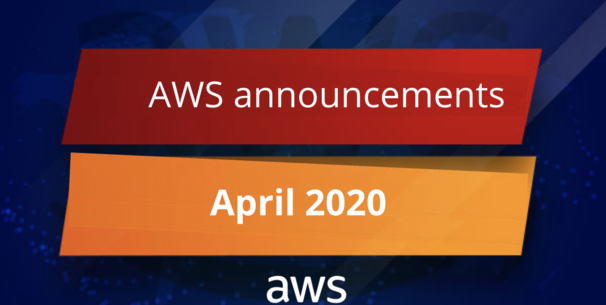
Our selection of announcements from AWS in April 2020
Our selection of announcements from AWS in April 2020
What follows isn’t a full list of all the AWS announcements made during April 2020, but is instead a selection most likely to benefit enterprises, SMEs or Startups.
Some of the highlights from April include the release of a COVID-19 public data lake, Amazon Elastic File System (EFS) support for Amazon Elastic Container Service (ECS) and AWS Fargate. But also, Migration Acceleration Program (MAP) for Windows, dramatic read performance increases to Amazon EFS, in-region read replicas for Amazon RDS SQL Server, AWS Wizard for SAP. last but not least, general availability for Cost Categories, and a new region in South Africa.
Migration Acceleration Program for Windows
MAP for Windows builds on the proven success of the AWS migration acceleration program. It provides services, best practices, tools, and experience delivered by APN Partners such as Renova Cloud to simplify and accelerate cloud adoption for Windows workloads. Having assistance alongside application & IT teams as well as financial incentives address common concerns associated with migrations and significantly lowers barriers to entry.
Whether migrating, modernizing, or employing a mix of both in an application portfolio, AWS is making it even easier to adopt the best cloud platform for Windows-based workloads.
To learn more about the announcement, click here or visit the MAP for Windows product page.
Amazon EFS Support for Amazon ECS and AWS Fargate
The nature of containers poses a significant challenge for applications and workflows that require a persistent file storage layer. In particular, enterprise customers with legacy applications often face this challenge, where data-intensive workloads such as machine learning require large amounts of data in close proximity to the code. To help with this, AWS has just enabled support for their Amazon EFS service in Amazon ECS and AWS Fargate, allowing an AWS-native solution for a scalable shared storage layer across a container fleet. With AWS Fargate this means that even while gaining the benefit of not having to manage the underlying compute infrastructure, containers can still connect to a managed, shared file storage system for their persistent data needs. This release enables organizations to continue their containerization efforts to gain efficiency and scalability for their applications.
To learn more about the announcement, click here.
AWS Cost Categories (General Availability)
Understanding and tracking cost is a fundamental component of running workloads in the Cloud. To aid companies in this challenge, AWS has made Cost Categories available to accurately track and assign costs to categories specific to their organization.
These categories can represent business units, projects, experiments, applications, geographies, or whatever breakdowns make sense for bundling together resource costs. The categories can span AWS accounts, and are defined by a set of rules using filters such as accounts, resource tags, and services along with operators like “Is”, “Is Not”, or “Contains”. The categories these rules define are available throughout the AWS Cost Management set of tools, including AWS Cost Explorer and AWS Budgets, and allow organizations to identify inefficiencies early on, as well as precisely plan budgets according to growth.
To start learning and using AWS Cost Categories, see the User Guide here.
In-Region Read Replicas for Amazon RDS SQL Server
There is now the capability to easily define and build read replicas for Amazon RDS SQL Servers, allowing for applications to split off high volumes of read or intensive reporting queries, to those replicas, reducing the stress on the main database server. Distributed Availability Groups are used to provide this functionality, and since AWS handles the configuration and network connectivity between the replica and primary server as part of the Amazon RDS service, the operational overhead for organizations is greatly reduced, allowing teams to focus even more on creating applications and solutions that serve the needs of the organization and its customers. To learn more about pricing details and regional availability, click here
Covid-19 Public Data Lake
Data is a vital tool in fighting the COVID-19 pandemic, and vast quantities are being collected daily to fuel that push. To aid in the global effort, AWS has built a public data lake housing case tracking data from the New York Times and John Hopkins. Along with hospital bed availability from Definitive Healthcare, and research articles from the Allen Institute for AI. The goal is that by making the data easily accessible and digestible, more experimentation is fostered leading to faster innovation on methods to combat the virus.
Additionally, AWS has launched CORD-19 Search which is fueled by data from the CORD-19 (COVID-19 Open Research Dataset) in the public data lake and powered by AWS services such as Amazon Kendra and Amazon Comprehend Medical. This tool will allow researchers faster and easier insights from over 47,000 research papers and documents using powerful natural language searches. Being able to quickly derive key insights from this data will be essential in the development of treatments and vaccines.
To learn more about how to use the AWS COVID-19 data lake for analysis, click here.
Our selection of announcements from AWS in April 2020



